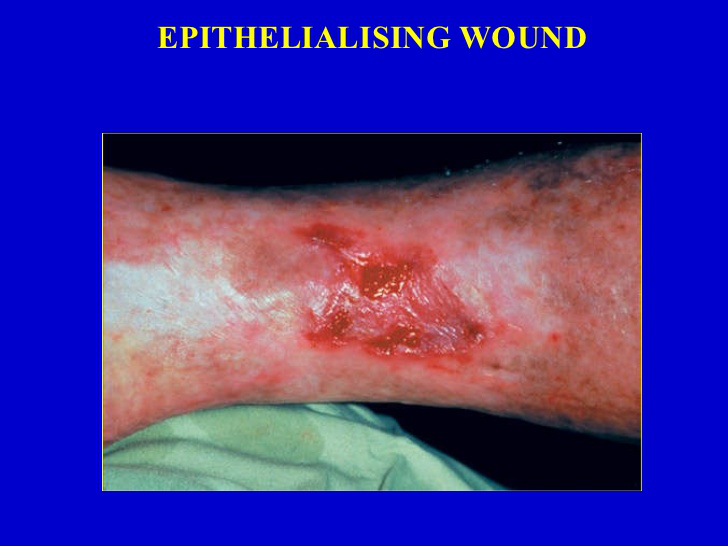Stimulation of Keratinocyte Wound Healing Responses and Re-Epithelialization by Novel Epoxy-Tiglianes via Protein Kinase C Activation
Novel epoxy-tiglianes, EBC-46 and EBC-211, are sourced from seeds of the Fountain’s Brushwood Tree, indigenous to Queensland. EBC-46 possess potent tumouricidal properties, through classical PKC activation, and is under development by our industrial partner, QBiotics Ltd., as a human and veterinary anti-cancer pharmaceutical. In clinical studies, EBC-46 also stimulated exceptional dermal healing, manifested as accelerated wound re-epithelialization, closure, and minimal scarring. This work describes epoxy-tigliane effects on keratinocyte wound healing responses and their underlying mechanisms of action.
Immortalized human epidermal keratinocytes (HaCaTs) were treated with EBC-46 or EBC-211 (0-10µg/ml). Cell cycle progression/proliferation was assessed by FACS analysis and MTT assay. HaCaT migration was assessed using in vitro scratch wound assays. Global gene expression changes induced by epoxy-tiglianes were quantified by Microarray analysis, with differentially expressed genes confirmed by protein level analysis. As epoxy-tiglianes mediate responses via classical protein kinase (PKC) activation, mechanistic studies were performed with BIM-1 (pan-PKC), Gö6976 (classical-PKC) and LY317615 (PKC-βI/PKC-βII) inhibitors. Western blotting confirmed phospho-PKC activation following epoxy-tigliane treatment.

Both epoxy-tiglianes induced significant HaCaT cell cycle progression and proliferation, and also promoted significant HaCaT scratch wound closure. Microarray analyses identified key genes differentially expressed in EBC-46/EBC-211-treated HaCaTs, which contribute to their stimulatory effects on keratinocyte proliferation and migration. Enhanced proliferative and migratory responses were significantly abrogated by BIM-1 and Gö6976, although LY317615 exhibited minimal inhibitory effects. PKC activation increased following epoxy-tigliane treatment.
Such findings explain the enhanced re-epithelialization responses in the epoxy-tigliane-treated skin and provide justification for their translational development as novel therapeutics for impaired wound re-epithelialization.
Author: Rachael L. Moses, Cardiff University, UK.
International Conference on Wound Care, Tissue Repair and Regenerative MedicineDate & venue: June 14-15, 2018 | London, UKWebsite: https://goo.gl/eLcFyZ
Immortalized human epidermal keratinocytes (HaCaTs) were treated with EBC-46 or EBC-211 (0-10µg/ml). Cell cycle progression/proliferation was assessed by FACS analysis and MTT assay. HaCaT migration was assessed using in vitro scratch wound assays. Global gene expression changes induced by epoxy-tiglianes were quantified by Microarray analysis, with differentially expressed genes confirmed by protein level analysis. As epoxy-tiglianes mediate responses via classical protein kinase (PKC) activation, mechanistic studies were performed with BIM-1 (pan-PKC), Gö6976 (classical-PKC) and LY317615 (PKC-βI/PKC-βII) inhibitors. Western blotting confirmed phospho-PKC activation following epoxy-tigliane treatment.

Both epoxy-tiglianes induced significant HaCaT cell cycle progression and proliferation, and also promoted significant HaCaT scratch wound closure. Microarray analyses identified key genes differentially expressed in EBC-46/EBC-211-treated HaCaTs, which contribute to their stimulatory effects on keratinocyte proliferation and migration. Enhanced proliferative and migratory responses were significantly abrogated by BIM-1 and Gö6976, although LY317615 exhibited minimal inhibitory effects. PKC activation increased following epoxy-tigliane treatment.
Such findings explain the enhanced re-epithelialization responses in the epoxy-tigliane-treated skin and provide justification for their translational development as novel therapeutics for impaired wound re-epithelialization.
Author: Rachael L. Moses, Cardiff University, UK.
International Conference on Wound Care, Tissue Repair and Regenerative MedicineDate & venue: June 14-15, 2018 | London, UKWebsite: https://goo.gl/eLcFyZ
Comments
Post a Comment